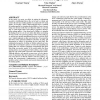Free Online Productivity Tools
i2Speak
i2Symbol
i2OCR
iTex2Img
iWeb2Print
iWeb2Shot
i2Type
iPdf2Split
iPdf2Merge
i2Bopomofo
i2Arabic
i2Style
i2Image
i2PDF
iLatex2Rtf
Sci2ools
110
click to vote
KDD
2009
ACM
2009
ACM
PSkip: estimating relevance ranking quality from web search clickthrough data
1 In this article, we report our efforts in mining the information encoded as clickthrough data in the server logs to evaluate and monitor the relevance ranking quality of a commercial web search engine. We describe a metric called pSkip that aims to quantify the ranking quality by estimating the probability of users encountering non relevant results that cost them the efforts to read and skip. A search engine with a lower pSkip is regarded as having a better ranking quality. A key design goal of pSkip is to integrate the findings from two sets of user studies that utilize eye-tracking devices to track users’ browsing patterns on the search result pages, and that use specially instrumented browsers to actively solicit users’ explicit judgments on their search activities. We present the derivation of the maximum likelihood estimation of pSkip and demonstrate its efficacy in describing the user study data. The mathematical properties of pSkip are further analyzed and compared with se...
Related Content
| Added | 26 Jul 2010 |
| Updated | 26 Jul 2010 |
| Type | Conference |
| Year | 2009 |
| Where | KDD |
| Authors | Kuansan Wang, Toby Walker, Zijian Zheng |
Comments (0)

